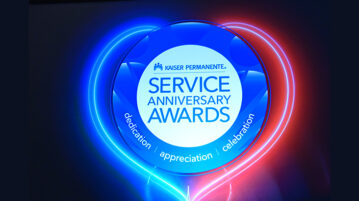This article was reposted from the MAPMG Vital Signs newsletter.
There is a word in South Africa, “ubuntu,” which can be translated as “I am because you are.” Mid-Atlantic Permanente Medical Group’s Regional Medical Director for Acute Care Services, Gene Gincherman, MD recently had an encounter with a member who made him feel just that.
Dr. Gincherman had a seemingly normal day in the CDU when in walked a nurse with two large stuffed bears. He quickly found out that this “thank you gift” was intended for him from a member he had recently cared for. The nurse shared that this particular member had been so pleased with not only the care he received, but also with the connection he had made with Dr. Gincherman that he was compelled to send a thank you gift in the form of two large stuffed bears!
Several days later, in an email exchange, Dr. Gincherman told the member that their connection was meaningful to him too and made him think about the South African word, ubuntu, or “I am because you are.” This prompted a response from the member of, “its people like you that keep shaping the person I become.”
It is not often that one gets to experience moments of great human connection and mutuality, and this offered Dr. Gincherman a moment that he will never forget
We caught up with Dr. Gincherman to learn more about how he was able to open himself up to this level of connection (in the CDU of all places!) and how experiences like this shape the way he practices medicine.
Vital Signs: What an incredibly unique story, Dr. Gincherman. How were you able to connect with this member so deeply?
Dr. Gincherman: I try my best to be fully present, and I was willing to be vulnerable by sharing my own feelings about what is truly important in my life. I’ve found that presence and vulnerability leads to human connection. I like to use mantras, to make it easier to be fully present. My favorite one is “Here, Now, This”, which I learned from an interview with Father Greg Boyle I heard on NPR.
Vital Signs: Did this connection, or other connections you have had, elicit any changes in the way you interact with others at work or at home?
Dr. Gincherman: It was very encouraging that during such a brief encounter in the CDU, both my patient and I were able to establish that level of connection and compassion – it was proof that even making small changes to live more openly and connected makes a big impact on myself and those around me. This encounter felt like an affirmation that I am onto something in my beliefs that intentional connection and focusing on people rather than diseases is what gives our lives meaning.
Vital Signs: What advice can you share with other physicians, inspired by this experience?
Dr. Gincherman: It seems to me that presence matters a lot. Mantras rock. There is wisdom in tenderness, human touch, vulnerability, and personal humility but also in occasional smile. Starting from a place of judgment never seems to work. When I try my best to follow these rules, at times, something magical happens.
Thank you, Dr. Gincherman, for giving us some inspiration to live more openly and connected!




